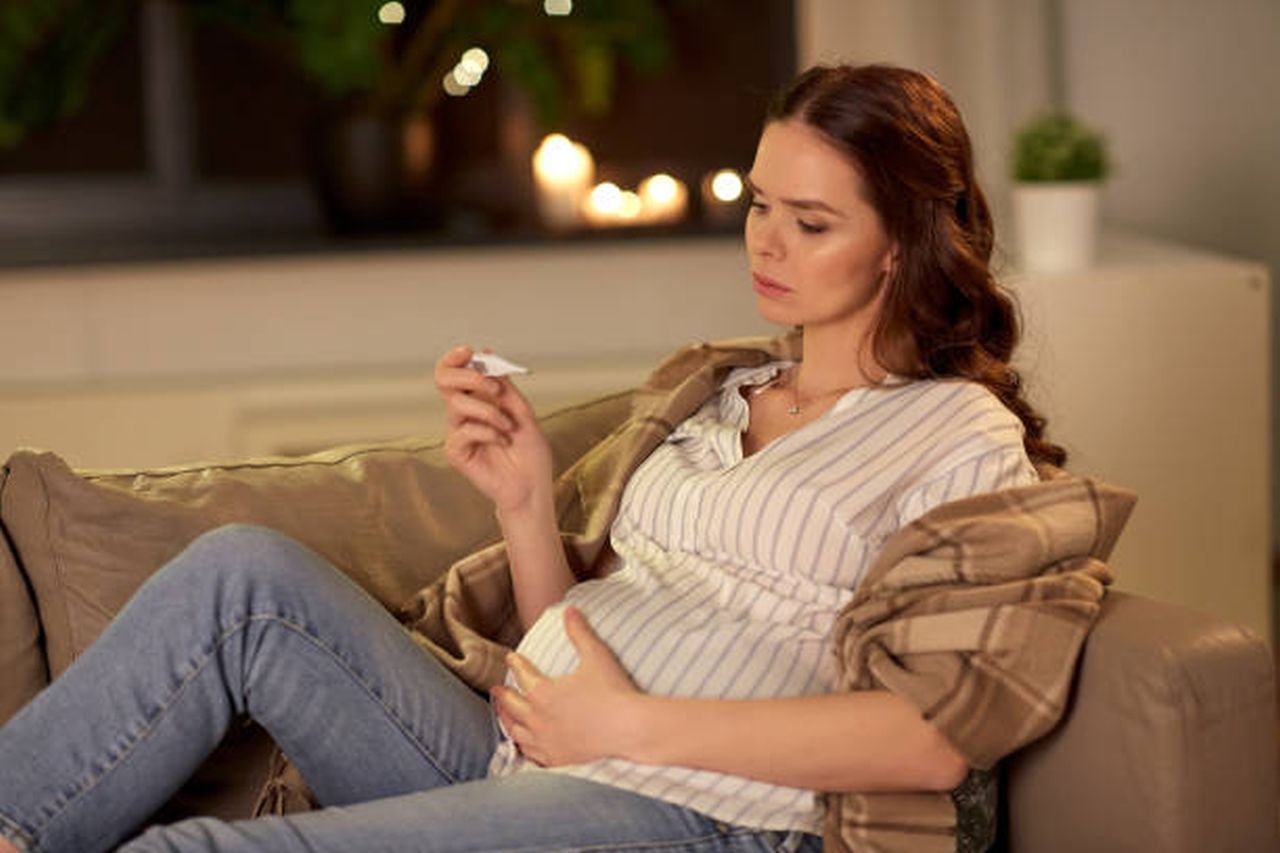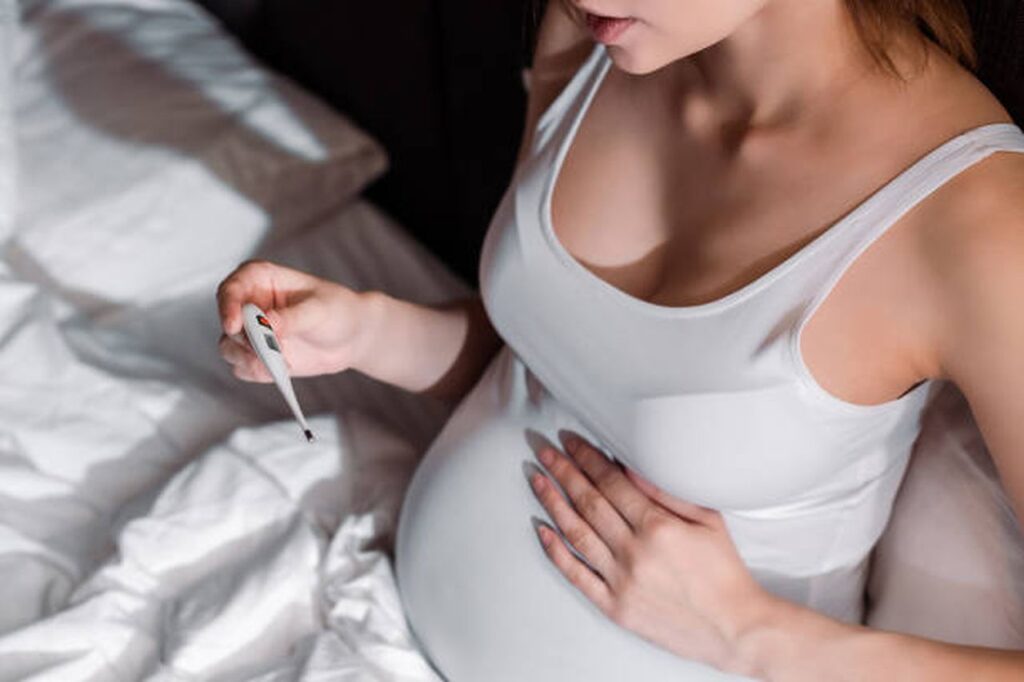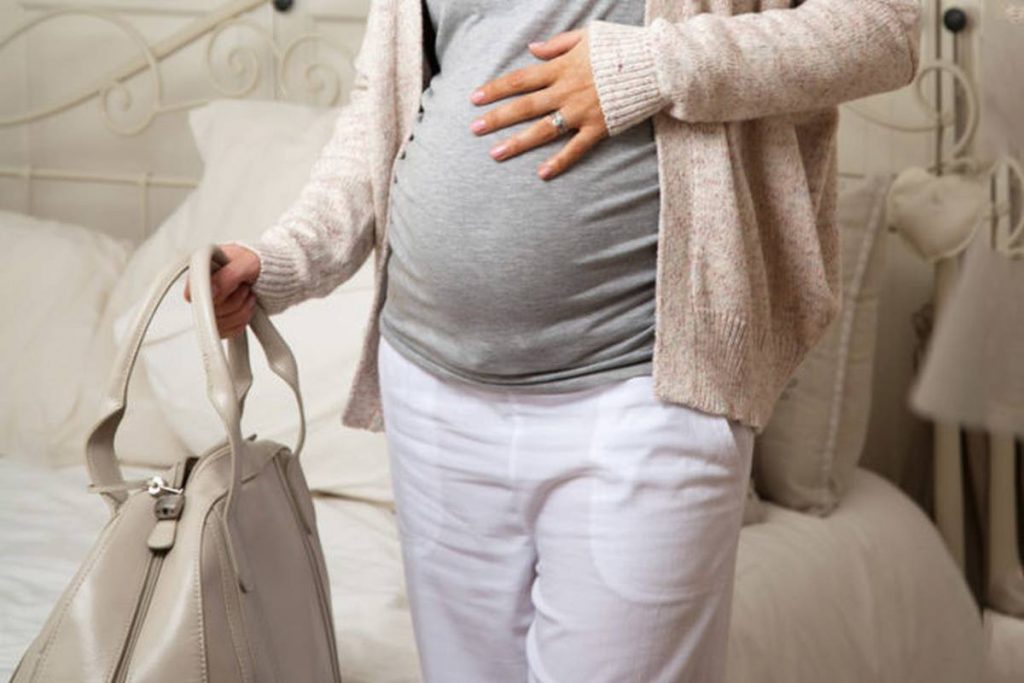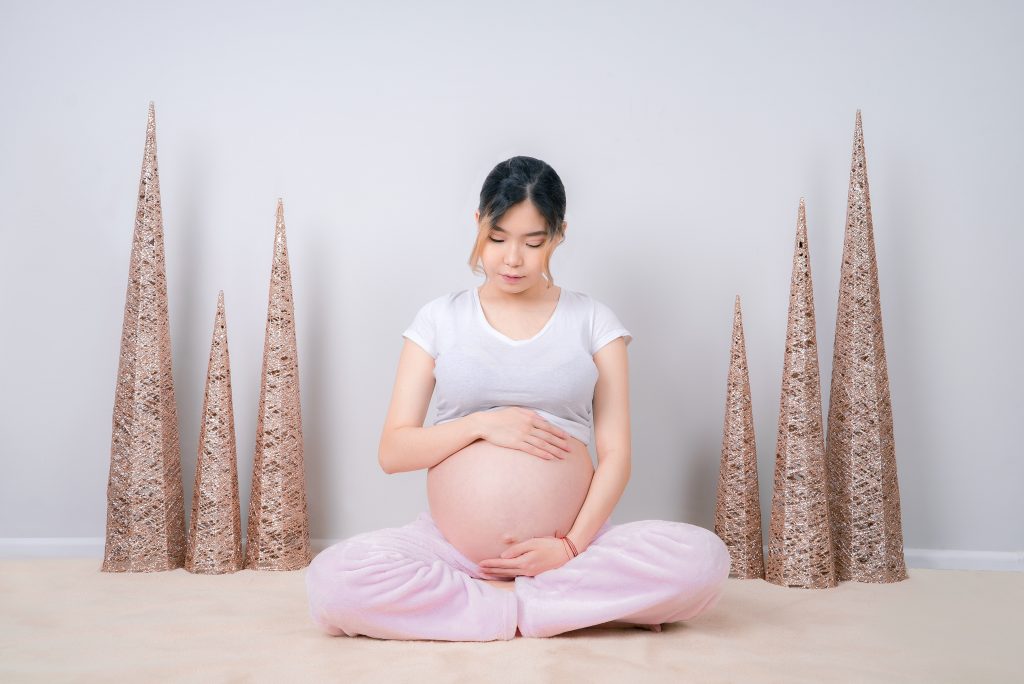There's a good chance you'll experience night sweats when pregnant, but you might wonder why that is.
This is because hormonal and physiological changes make it more difficult for your body to cool down as you sleep.
Perspiration serves as an inbuilt thermostat for your body. During pregnancy, it is usual for the mother's core temperature to rise somewhat.
This is a natural consequence of giving birth. Hormonal changes and slight weight gain both contribute to an increase in blood volume.
When you start to feel hot, sweating is nature's way of cooling you down so you don't risk harming yourself or your unborn child.
Intense sweating may result from hormonal fluctuations that mislead the hypothalamus into thinking the body is hotter than it actually is. This could explain why it feels like 100 degrees outside while the actual temperature is only 75.
Most pregnant women sweating is quite normal and nothing to worry about. However, excessive perspiration may also indicate a more serious health issue that is unrelated to pregnancy. If you find that your sweating is becoming unbearable, you should see a doctor.
Why You Sweat in Your Sleep
Excessive sweating during the night is what medical professionals mean when they talk about "night sweats," so excessive that it forces sufferers to get out of bed and change into fresh pyjamas.
In addition, they can explain the less severe but nevertheless bothersome heat flashes that occur at night.
Night sweats happen to a lot of people.
While 35% of pregnant women reported experiencing hot flashes in a 2013 study, evidence on the prevalence of night sweats in pregnant women is lacking. And if so, why?
A thyroid condition, an infection, or even the normal physiological changes that occur during pregnancy can all cause night sweats and difficulty maintaining body temperature. All right, let's cut to the chase.
Causes
Increased levels of hormones during pregnancy are to blame for a wide range of unpleasant side effects, including but not limited to haemorrhoids, bleeding gums, acne, and other skin problems. Hormonal shifts occur when sperm fuses with an egg, confusing the hypothalamus (the region of the brain that controls body temperature) so that it registers heat even when the outside temperature is a pleasant 70 degrees Fahrenheit.
When things start to heat up, your body's natural cooling mechanism kicks in and you start sweating.
Your unborn child and, certainly, an abnormally high body mass index (try to keep your pregnancy weight gain within the range your doctor recommends).
By the conclusion of the third trimester, your baby has been baking away in your internal oven for quite some time. Now they can stay toasty as you perspire to death in the heat!
Your own body heat can feel like a mini heater if you're cold. The interior climate of the body is changing, however, which is why you're perspiring so heavily. Some of the most prevalent reasons for sweating during pregnancy include the following.
Check out the wide variety of infant car seats we have at My Baby Nursery.
Hormonal Shifts
Changes in hormone levels are to blame for the multitude of pregnancy-related symptoms and annoyances, including a mild but noticeable rise in body temperature and the accompanying rise in perspiration.
Increased Blood Circulation
During pregnancy, your core body temperature may rise due to increased blood circulation. Your blood volume will increase by about half by the beginning of the third trimester.
Increased Metabolism
It stands to reason that your calorie burn and body temperature will increase during pregnancy due to the increased demands placed on your body. As a result, you're not just serving the master you already have, but also the master you're creating from scratch.
Putting on Weight
During the third trimester, extra weight might make it difficult to move around, and the extra effort necessary to do so can cause a rise in core body temperature.
You may have to use more energy than usual to maintain your upright position when carrying a baby, which might cause your internal body temperature to rise.
Weather
It will take your body a little more effort to cool down when you're expecting, so you might sweat more if you have to spend time in hot, humid weather.
Physical Activity
Physical activity during pregnancy, such as working out, cleaning, going for a walk, or carrying heavy shopping, is often accompanied by increased perspiration.
Anxiety
Humans have an involuntary physiological response to stress and anxiety, manifesting as increased perspiration. Increased sweating has been linked to anxiety and mood swings during pregnancy.
Illness
Having a fever from a cold, the flu, or another illness can raise your core body temperature, which in turn might cause you to sweat more.
Hyperthyroidism
A normal part of pregnancy is an increase in core body temperature and perspiration due to hormonal changes, including an increase in thyroid activity.
The overactive thyroid that characterises hyperthyroidism is not typical.
Increased perspiration and other signals of a sped-up heart rate and body processes are symptoms of a hyperactive thyroid.
Medication
Excessive sweating is a side effect of some medications. It is common for pregnant women to take medication for nausea and vomiting to help them through the morning sickness.
Food And Drink
Cutting less on stimulants like caffeine and alcohol as well as spicy foods might assist reduce sweating that isn't healthful. Consuming alcohol or caffeine is discouraged, and eating spicy foods is known to cause heartburn and sweating during pregnancy.
Hypoglycemia (Low Blood Sugar)
The growth of your baby, from the size of a seed to that of a watermelon, requires your metabolism to work overtime to keep up with its voracious appetite.
As a result, you may feel a little tired at the end of the day if you don't consume enough calories, or a balanced number of calories at different times of the day.
This can lead to hypoglycemia (low blood sugar). Night sweats are a possible indication of hypoglycemia.
Women should be mindful of the connection between diabetes and night sweats despite studies demonstrating that non-diabetic pregnant women have a minimal risk of hypoglycemia.

Is There Any Way to Prevent Pregnancy-Related Sweating?
Although there is no surefire method to eliminate perspiration, you can take a number of measures to put yourself at ease.
Take care to drink enough fluids every day. Sweating excessively can cause you to get dehydrated and dizzy. It's time for a drink, so have one. Drinking cold liquids can help with temperature regulation as well.
Don't let your mouth go dry before you drink some cool water, and keep a bottle on hand. If you start to feel too hot, you can either drink some cold water or spray the back of your neck with it.
You need to hydrate frequently, and you need to hydrate much more when the weather is high or when you're physically active.
Water is the best choice, although iced herbal tea, milk, natural juices, and raw fruits and vegetables are all okay (Avoid sugary beverages like soda if you want to keep your weight down).
If your urine is nearly colourless or only slightly yellow, you are properly hydrated.
Stay out of the hot sun and in air-conditioned buildings instead.
When the temperature and humidity are both above 90 degrees Fahrenheit, fans are ineffective. This is true whether it is day or night. You should stay away from hot tubs and saunas because of the potential risks they pose to an unborn child.
Do not exercise while the sun is at its hottest, or you risk overheating. You can avoid working out in the heat of the day by going for a walk in the wee hours of the morning or the late hours of the night, by taking a class at a cool gym, or by jumping in the pool (an added benefit is that it could reduce swelling in your ankles and feet).
Dress in a carefree manner that allows you to move freely. Layer your clothing so you may easily lose or add warmth as needed.
Put a few blankets on your bed. Make it a top priority to maintain the same rate of temperature fluctuation at night.
Cover your mattress with a towel. This can help if you sweat a lot when you sleep.
You should certainly avoid hot drinks and spicy foods when pregnant if you notice that they make you sweat excessively.
Pack a small, portable fan. Fanning oneself can help you cool off in a pinch since it causes perspiration to evaporate.
Powder is a safe alternative to talc. Applying a small amount of powder to the skin in areas where friction is likely to occur will help avoid heat rash during pregnancy.
Why and How to Stop Perspiring While Pregnant
You can try to remain calm, but you won't be able to stop the surge in your hormones or the accompanying weight increase.
Make sure you have a reliable air conditioner or fan, as well as access to a reliable ice maker.
Is There a Time Frame for When You Can Stop Perspiring
Pregnancy and the postpartum period tend to be times of unusual warmth.
As your hormones normalise again, the perspiration effect should fade away over the course of a few months after delivery, around the time you start ovulating again.
Your basal temperature will return to normal shortly after giving birth.
Many women, however, claim that their body temperature remained permanently lower than it was before they were pregnant. This is fantastic news for those of you who were often complaining about the chill. So everything seems to be normal and perfect!
In need of a mattress for a baby's crib in the nursery? Stop right there. I've got you covered with my baby's nursery.
When Pregnancy Night Sweats Are Most Common
They Might Be an Indicator of Pregnancy.
Night sweats and hot flashes, which some women experience in the early stages of pregnancy, have been widely circulated as possible indicators of an impending pregnancy.
There are periods in a woman's menstrual cycle when her basal body temperature actually rises.
During your fertile window, when your body signals your ovaries to release an egg, you may see this increase.
Hormonal changes in early pregnancy might also lead to sweating or overheating during sleep. Even so, it's best to be "positive" and rely on your tried-and-true pregnancy test in addition to your OB.
First Trimester To Postpartum
According to a long-term study conducted in 2010, a pregnant woman's core body temperature is highest during the first trimester and gradually drops throughout the next trimester and for up to three months after giving birth.
However, a 2013 study indicated that 29% of postpartum women experienced hot flashes.
In other words, your body temperature may experience some unexpected swings as a result of the ebb and flow of pregnancy and childbirth.
The "honeymoon" period of pregnancy, during which you wake up drenched, will likely soon cease, as will the persistent fatigue of the first trimester.
When Does Sweating During Pregnancy Begin and End?
During and after pregnancy, it's common to sweat more than usual. However, heavy perspiration is most common during the first and third trimesters.
Sweating is a common early pregnancy symptom.
Soon after becoming pregnant, your body temperature will rise slightly due to fluctuating hormones and increased blood flow; this minor increase will cause you to feel hot and cause you to sweat more than usual.
It's common for this to be one of the first pregnancy symptoms a woman recognises.
During the second trimester, some pregnant women experience a decrease in their perspiration.
In the final weeks before giving birth, though, it is not unheard of, especially if you are waiting out the warmer months in your third trimester.
About 35% of pregnant and postpartum women also have hot flashes, according to studies.
Persistent sweating after giving birth is also common. It's a way your body gets rid of the extra fluid it gained during pregnancy.
Moreover, hormonal changes after giving birth might cause night sweats (nocturnal hyperhidrosis) as your body tries to reestablish its equilibrium.
Your body's hormones will be rebalancing themselves and getting back to normal for a few weeks after giving birth, and you may still experience some sweating during this time.
FAQS About Pregnancy
Estrogens lower body temperatures by increasing the body's ability to remove heat through sweating. Progesterone can also increase your body's temperature. The increase in night sweating you're experiencing during pregnancy is most likely due to your body adjusting to these changes.
These normal thyroid hormone fluctuations during pregnancy, in addition to those that may be caused by more serious thyroid disorders and diseases, can cause temperature regulation issues and, therefore, lead to night sweats.
Especially in the first trimester, your hormones are on overdrive – meaning night sweats and early pregnancy are common. And you literally have no control over when, where, or how they'll show up. But in most cases, sweat will accompany them.
- Keep hydrated. You're losing water when you sweat a lot, which can make you feel dizzy and faint. ...
- Stay out of the sun and in air-conditioned environments, if you can. ...
- Avoid working out in the heat of the day. ...
- Wear loose, light clothing. ...
- Carry a hand-held fan.
Most women report that it peaks around two weeks after childbirth and begins to improve after that, resolving completely by the six-week mark. If you experience night sweats that do not resolve after six weeks, it becomes more likely that there is another underlying cause. In those cases, your OB-GYN can help.
Getting Some Relief
We all know how quickly a pregnant woman's fears can spiral into the worst case scenario. However, there is usually an easy solution to the problem of staying cool.
One of the first steps in treating night sweats is pinpointing their root cause.
Most pregnant women accept nocturnal sweats as a typical side effect of their bodies going through a lot of changes.
But that doesn't mean you can't get some relief from it. If you've noticed any unusual symptoms, including night sweats, it's best to consult a medical professional about them.
It may help to experiment with different sleeping arrangements in the meanwhile.
It has been shown that factors such as room temperature and the type of pyjamas worn can affect how well your body regulates its temperature as you sleep.
Reduce the temperature of your air conditioner by a few degrees, switch to a lighter blanket, and wear loose, cool clothes made of cotton or another breathable material.
Consult your OB-GYN right away if you have night sweats and feel a more serious medical condition or medicine is to blame, or if your night sweats are accompanied by a fever, rash, or any other symptom of concern.
Feeling hot and sweaty during pregnancy is a normal experience, regardless of the weather.

Even in the dead of winter, pregnant women can sweat. You can't control how your body reacts to pregnancy hormones, but there are practical methods you may use to cope.
- To prevent dehydration and to replenish the moisture lost via perspiration, drink lots of water or other nutritious fluids.
- Wear loose, airy garments made of natural materials like cotton, and stay away from heavy, restrictive wool.
- Dress in a few thin layers that can be easily shed if you get too hot.
- It's recommended that you relax and rejuvenate with a daily mild bath or shower.
- Use antiperspirant.
- Put on some headphones and crank up the stereo.
- Avoid anything that can make you hot or make you sweat more, such spicy foods or alcohol.
- Don't leave the house without a portable fan.
- Have baby wipes on hand for a quick refresher when you're hot and sticky.
- Try rinsing your face with cold water or pressing a moist cloth across your forehead.
- Gaining weight beyond what is recommended by your doctor might lead to an uncomfortable increase in body temperature, therefore it's important to watch your weight.
When The Weather Is Hot
As your pregnancy progresses, you may find that you need to take extra precautions to stay cool in hot and humid climates.
- Avoid being in the sun, especially during the hottest portion of the day, and look for places to rest in the shade.
- Apply sunscreen before venturing outdoors.
- If you must go out, try to do so early in the morning or late at night, when temperatures are typically lower.
- If you must work out in the heat, do it in a cool indoor area or wait until the afternoon to do so if you must work out outside.
- Visit cool establishments like shopping centres and movie theatres.
- Enjoy a refreshing swim.
At Night
Any pregnant woman, but especially one who suffers from night sweats, may find the third trimester a difficult time for sleep.
Night sweats involve more than just perspiring excessively while you sleep. Night sweats have been known to soak through pyjamas and bedsheets.
Having night sweats is not only unpleasant, but it can also disrupt your sleep by waking you up or causing you to toss and turn.
When you're experiencing night sweats throughout pregnancy or after giving birth, here are some things to try.
- Put on some comfy, breathable pyjamas.
- Sheets should be lightweight and airy.
- Swap up your heavy blanket with something more breathable. Sheets and blankets can be layered so that only the amount needed is used at night.
- Cool the room down by cranking up the air conditioning.
- Use a floor fan in your bedroom, or if you don't have one, put on your ceiling fan.
- Be sure to open a window for some much-needed ventilation and cooling.
- To prevent your bedding from getting damp and sweaty at night, try sleeping on a towel or many towels. Changing and washing sheets daily or in the middle of the night is a hassle, but washing towels is a breeze in comparison.
- Replace the fluids you lose overnight via perspiration by drinking plenty of water and other nutritious drinks during the day.
Know When to See a Doctor
Even while night sweats and sweating throughout the day are common during pregnancy, it's still important to discuss any and all symptoms with your doctor. Then, your doctor or midwife will know for sure if your symptoms are due to pregnancy or not.
After giving birth, your doctor will be there to answer any questions you may have, provide recommendations for pain management, and check in with you to make sure your body (and sweat rate) have returned to normal. If any of these apply to you, it's time to make that urgent phone call to the doctor
- There is a generalised itchiness even if a rash is not present.
- You have a fever higher than 100.2 degrees Fahrenheit
- It seems like you're either sick or dehydrated.
- Felt like passing out or dizzy.
- You are in a terrible amount of pain.
- Six weeks after giving birth, sweating does not improve.
- Is there anything you need to ask or worry about?
Conclusion
Excessive sweating during the night is what medical professionals mean when they talk about "night sweats". Increased levels of hormones during pregnancy are to blame for a wide range of unpleasant side effects, including but not limited to haemorrhoids, bleeding gums, acne, and other skin problems. Changes in hormone levels are to blame for a mild but noticeable rise in body temperature and the accompanying rise in perspiration. Increased sweating has been linked to anxiety and mood swings during pregnancy. Extra weight might make it difficult to move around, and the extra effort necessary can cause a rise in core body temperature.
There is no surefire way to prevent pregnancy-related perspiration, but there are a number of things you can do to help reduce it. Pregnancy and the postpartum period tend to be times of unusual warmth. You can try to remain calm, but you won't be able to stop the surge in hormones or the accompanying weight increase. The perspiration effect should fade away over the course of a few months after delivery. Sweating is a common early pregnancy symptom.
About 35% of pregnant and postpartum women also have hot flashes. During and after pregnancy, it's common to sweat more than usual. However, heavy perspiration is most common during the first and third trimesters. As a pregnant woman, you may need to take extra precautions to stay cool in hot and humid climates. Avoid being in the sun, especially during the hottest portion of the day, and look for places to rest in the shade.
If you're experiencing night sweats throughout pregnancy or after giving birth, here are some things to try. Night sweats and sweating throughout the day are common during pregnancy. It's still important to discuss any and all symptoms with your doctor. Changing and washing sheets daily or in the middle of the night is a hassle. After giving birth, your doctor will be there to answer any questions you may have.
Content Summary
- There's a good chance you'll experience night sweats when pregnant, but you might wonder why that is.
- This is because hormonal and physiological changes make it more difficult for your body to cool down as you sleep.
- Perspiration serves as an inbuilt thermostat for your body.
- Intense sweating may result from hormonal fluctuations that mislead the hypothalamus into thinking the body is hotter than it actually is.
- However, excessive perspiration may also indicate a more serious health issue that is unrelated to pregnancy.
- If you find that your sweating is becoming unbearable, you should see a doctor.
- While 35% of pregnant women reported experiencing hot flashes in a 2013 study, evidence on the prevalence of night sweats in pregnant women is lacking.
- A thyroid condition, an infection, or even the normal physiological changes that occur during pregnancy can all cause night sweats and difficulty maintaining body temperature.
- Increased levels of hormones during pregnancy are to blame for a wide range of unpleasant side effects, including but not limited to haemorrhoids, bleeding gums, acne, and other skin problems.
- Your unborn child and, certainly, an abnormally high body mass index (try to keep your pregnancy weight gain within the range your doctor recommends).
- Now they can stay toasty as you perspire to death in the heat!
- Some of the most prevalent reasons for sweating during pregnancy include the following.
- Changes in hormone levels are to blame for the multitude of pregnancy-related symptoms and annoyances, including a mild but noticeable rise in body temperature and the accompanying rise in perspiration.
- Humans have an involuntary physiological response to stress and anxiety, manifesting as increased perspiration.
- Increased sweating has been linked to anxiety and mood swings during pregnancy.
- Having a fever from a cold, the flu, or another illness can raise your core body temperature, which in turn might cause you to sweat more.
- The overactive thyroid that characterises hyperthyroidism is not typical.
- Increased perspiration and other signals of a sped-up heart rate and body processes are symptoms of a hyperactive thyroid.
- Excessive sweating is a side effect of some medications.
- Night sweats are a possible indication of hypoglycemia.
- Take care to drink enough fluids every day.
- You should stay away from hot tubs and saunas because of the potential risks they pose to an unborn child.
- Do not exercise while the sun is at its hottest, or you risk overheating.
- You can avoid working out in the heat of the day by going for a walk in the wee hours of the morning or the late hours of the night, by taking a class at a cool gym, or by jumping in the pool (an added benefit is that it could reduce swelling in your ankles and feet).
- Put a few blankets on your bed.
- Make it a top priority to maintain the same rate of temperature fluctuation at night.
- Cover your mattress with a towel.
- This can help if you sweat a lot when you sleep.
- You should certainly avoid hot drinks and spicy foods when pregnant if you notice that they make you sweat excessively.
- Pack a small, portable fan.
- Applying a small amount of powder to the skin in areas where friction is likely to occur will help avoid heat rash during pregnancy.
- You can try to remain calm, but you won't be able to stop the surge in your hormones or the accompanying weight increase.
- Make sure you have a reliable air conditioner or fan, as well as access to a reliable ice maker.
- Pregnancy and the postpartum period tend to be times of unusual warmth.
- Night sweats and hot flashes, which some women experience in the early stages of pregnancy, have been widely circulated as possible indicators of an impending pregnancy.
- There are periods in a woman's menstrual cycle when her basal body temperature actually rises.
- Hormonal changes in early pregnancy might also lead to sweating or overheating during sleep.
- Even so, it's best to be "positive" and rely on your tried-and-true pregnancy test in addition to your OB.
- However, a 2013 study indicated that 29% of postpartum women experienced hot flashes.
- During and after pregnancy, it's common to sweat more than usual.
- Sweating is a common early pregnancy symptom.
- About 35% of pregnant and postpartum women also have hot flashes, according to studies.
- Persistent sweating after giving birth is also common.
- It's a way your body gets rid of the extra fluid it gained during pregnancy.
- However, there is usually an easy solution to the problem of staying cool.
- One of the first steps in treating night sweats is pinpointing their root cause.
- If you've noticed any unusual symptoms, including night sweats, it's best to consult a medical professional about them.
- Consult your OB-GYN right away if you have night sweats and feel a more serious medical condition or medicine is to blame, or if your night sweats are accompanied by a fever, rash, or any other symptom of concern.
- Feeling hot and sweaty during pregnancy is a normal experience, regardless of the weather.
- You can't control how your body reacts to pregnancy hormones, but there are practical methods you may use to cope.
- Use antiperspirant.
- Don't leave the house without a portable fan.
- As your pregnancy progresses, you may find that you need to take extra precautions to stay cool in hot and humid climates.
- Avoid being in the sun, especially during the hottest portion of the day, and look for places to rest in the shade.
- Apply sunscreen before venturing outdoors.
- If you must work out in the heat, do it in a cool indoor area or wait until the afternoon to do so if you must work out outside.
- Enjoy a refreshing swim.
- Any pregnant woman, but especially one who suffers from night sweats, may find the third trimester a difficult time for sleep.
- Having night sweats is not only unpleasant, but it can also disrupt your sleep by waking you up or causing you to toss and turn.
- When you're experiencing night sweats throughout pregnancy or after giving birth, here are some things to try.
- Put on some comfy, breathable pyjamas.
- Use a floor fan in your bedroom, or if you don't have one, put on your ceiling fan.
- Be sure to open a window for some much-needed ventilation and cooling.
- To prevent your bedding from getting damp and sweaty at night, try sleeping on a towel or many towels.
- Replace the fluids you lose overnight via perspiration by drinking plenty of water and other nutritious drinks during the day.
- Even while night sweats and sweating throughout the day are common during pregnancy, it's still important to discuss any and all symptoms with your doctor.
- Then, your doctor or midwife will know for sure if your symptoms are due to pregnancy or not.
- If any of these apply to you, it's time to make that urgent phone call to the doctor There is a generalised itchiness even if a rash is not present.






